Great googly-moogly! Groovy gobs of graphic goodness!
Joey Q. and his stupid policy notwithstanding, a lot of good graphic novels have come out recently. Not from Marvel, of course, but other companies, luckily, don't have the Q running them. The ones I bought recently are, with one exception, ones you should check out. Here are some brief reviews, in alphabetical order because I'm anal retentive.
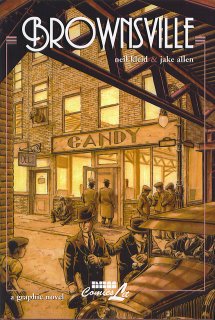 Brownsville by Neil Kleid and Jake Allen. Published by Comicslit, an imprint of Nantier Beall Minoustchine Publishing, Inc. $18.95.
Brownsville by Neil Kleid and Jake Allen. Published by Comicslit, an imprint of Nantier Beall Minoustchine Publishing, Inc. $18.95.
The high concept of Brownsville is "Jewish gangsters of the 1930s." We tend to think of gangsters as Italian, but in Brooklyn and parts of Manhattan in the 1930s the Jews ran things, and Kleid and Allen do a great job of bringing this forgotten world to life. They focus mainly on Albert Tannenbaum, who begins like a lot of youngsters, in awe of the riches and power of the local gangsters and is looking for a way to rebel against his father. He starts small, as usual, but eventually gets in tight with the gangsters and the bosses, including Louis Buchalter. The book is about his rise and fall, but also the rise and fall of organized crime in New York, as it spans the decade of the 1930s and shows the violence these men were willing to commit and the consequences of their actions.
It's not the most original idea, but it is interesting to see it from a Jewish perspective. The book is full of historical figures and what I can only assume is factual data, and Kleid keeps everything humming along, showing what these men do and how they eventually sell each other out. There is no honor here, only looking out for themselves, which is an interesting counterpoint to the myth of the Mob. Allie, especially, is a fascinating character, as he never quite seems to fit in with the gang, even when he's committing murder. He's very much a man who yearns for his father's approval, even after he rejects everything his father stands for. In the last act of the book, when he has been arrested and must choose whether to testify against his former employers, it is his family and the reminder that you can be someone in this world even if you're not rich and powerful that pushes him to his choice. It's an interesting arc for the character.
The art is stark and powerful. Each character looks vaguely the same, but Allen still manages to give them each a distinctive look. The cast is very big, and only once or twice did I have trouble keeping track of who was who based on what they looked like. After some initial confusion, it was easy to identify each person even though they were all dressed alike and were drawn in similar fashion. Allen evokes the time period very nicely, and the book (in black and white) is a pleasure to look at.
One of the few complaints I had about the book is its lack of Jewishness, for want of a better word. Very rarely does Kleid show how these gangsters were so different from Italians. It would have been interesting to see more of a contrast between the Catholic Mob and the Jewish one. He delves into it late in the book, and it made the characters even more interesting, so it was disappointing he didn't do it sooner. After all, we think of gangsters as good Catholics, getting their babies christened while their underlings gun down competitors, and although I wouldn't have wanted Kleid to dip into those sorts of clichés, it would have been nice to see the religious aspect of these men (if it existed) fleshed out a little more.
This is a fine book, and I hope someone at least tried to get it for free over at Jason's blog. If not, keep an eye out for it and pick it up. A very good read.
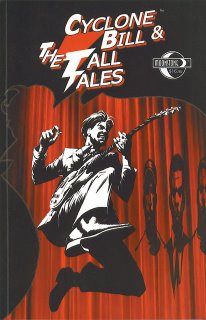 Cyclone Bill and the Tall Tales by Dan Dougherty. Published by Moonstone. $16.95.
Cyclone Bill and the Tall Tales by Dan Dougherty. Published by Moonstone. $16.95.
This book is so astonishingly good for the first three-quarters that it's an even bigger shame that it goes a bit off the rails at the end - not enough to ruin it, but enough to make it a shame. I still recommend it highly, but it's just so strange how wrong it goes.
The story seems simple enough. Cyclone Bill and the Tall Tales are a band that burst onto the scene with a brilliant album, had some problems, reunited for a second album, and then, one night, Bill was shot and killed while he was on stage. The book begins with a documentary filmmaker, Maggie Bloom, at Graceland, where she has come to beg the ghost of Elvis to stop haunting her. Why is he haunting her? Ah, but that's part of the story, isn't it? She was hired by Bill's girlfriend to make a documentary about him, and she was filming the night he was killed. Bill's band shows up at Graceland as well to discover the truth about Bill's life and death. They watch the film Maggie has shot and slowly learn the story of Bill when they weren't around. Maggie, meanwhile, continues to be haunted.
It's a gripping premise, and the way it unfolds it done very nicely. It turns into a dense tale of betrayal and the quest for fame, and what each person in the story will do to attain it. The man on trial for Bill's murder, Oscar Burden, is a rival artist, but his "band," such as it is, consists of fans who audition constantly depending on what city he's in. He is trying to break down the walls of celebrity, the walls that separate artist from audience, but in the process he becomes a huge celebrity - and steals Bill's girlfriend Rhoda. Each person in the book loses some part of themselves to gain fame, and the implications of this are often front and center in the book, in a way that rises above cliché, which is nice. The ghost story is creepy, too - Maggie isn't sure if she's insane or if she's actually being haunted. Meanwhile, her yearning for Bill's girlfriend complicates both her own sense of self and her relationships with the band. The story, with the presence of Elvis always near, gets under your skin and twists you up - it could easily come apart, but it doesn't.
Until the end, that is. I'm not going to go into it, because I don't want to spoil how the murder trial turns out or how Bill's, and Rhoda's, and Maggie's, and Oscar's quests for fame resolve, but let's just say everything gets a bit too literal. A clue is provided by the cover, but that's all I'm going to say. It's disappointing because it was such a nice psychological drama, and it feels like Dougherty takes the easy way out. Oh well - he wouldn't be the first.
The art is very good - rough and tumble, like rock itself, but the scenes that need to be different - like the creepy ones - convey that sense well. Ironically, the art really shines in the last section, when the story comes apart a bit. Overall, it's a good-looking book.
I definitely recommend this book if you can hunt it down. You may not even mind the ending. I don't even really mind the ending, I just thought it wasn't as good as the rest of the book. But it's certainly worth checking out.
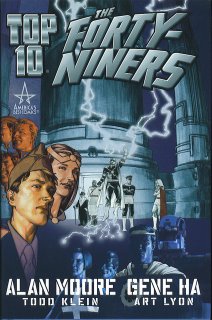 Top 10: The Forty-Niners by Alan Moore and Gene Ha. Published by America's Best Comics. $24.99.
Top 10: The Forty-Niners by Alan Moore and Gene Ha. Published by America's Best Comics. $24.99.
This is coming out (or just came out?) in softcover, so if you don't want to pony up 25 dollars for it, get it in that format. I'm not going to say a lot about this, because it's been out for a while, a lot of other people have said a lot about it, and it's Alan Moore and Gene Ha, so you can guess it's pretty good. That being said, I wonder if this is not as good as it could be, because Moore and Ha like being cute too much with it. It's a good read, and I actually like it more than Top 10 the series, because as much as I enjoyed that (I'm conflicted, so sue me), that was definitely a bit too cutesy for me. By "cutesy" I mean "seeing how many comic characters we can squeeze into the book and make everyone laugh." I don't know much about past comic characters, and I don't have Moore's obsessive memory about everything I've ever seen or read, so it annoyed me, especially because sometimes (not always, but sometimes) the main story was pushed aside for the wallowing in cutesiness. This reins that in a bit, but it's still there, and I just wonder if the slavish love that was dropped on this book was because nerds everywhere were impressed with their arcane knowledge of who is strolling by in the background.
Which is a shame, because this is a nice story about the beginnings of Neopolis and the discrimination that exists against "science heroes" (as well as more mundane minorities like homosexuals) and the government's policy toward Nazi scientists captured at the end of the war. It's a good story, and it's beautifully illustrated by Ha. His work on the series was good, but he obviously had more time to do this, and it shows.
It's a good book, and worth your while, but I wonder if it was voted best original graphic novel by the bloggers in Chris Tamarri's poll because it was the only OGN most people read last year. I wonder.
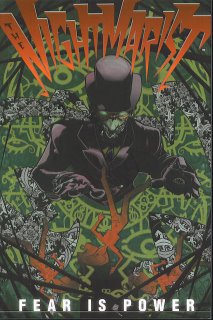 The Nightmarist by Duncan Rouleau. Published by Active Images. $14.99.
The Nightmarist by Duncan Rouleau. Published by Active Images. $14.99.
The Nightmarist is truly a weird and wonderfully bizarre book. I knew Rouleau only from his stint on Wildcats 3.0, and although I liked his art well enough on that book, it's nothing compared to what he unleashes on this. This is a hard book to read, because it's crowded with images and dense with text on some pages, but it's definitely worth your while. It's hard to describe, but I'll give it a go:
Beth Sorrensen is a young woman who has bad dreams. Nothing shocking there, but we learn that her father was an artist who committed suicide, which naturally causes her some problems, and she's seeing a doctor to work out her issues. She quickly realizes that there is something unusual about her dreams - she is being visited by a weird figure who calls himself the Nightmarist, and her dreams are starting to visit her when she's awake. The Nightmarist tells her that he is an agent of the Ministry of Dreams, which guards people when they sleep from being taken over by the Arbus, demon-like creatures who turn their victims insane and cause them to commit all sorts of horrible acts. In all this, Beth might just be the savior of mankind. She, of course, wants nothing to do with it, and she can't defeat the Arbus until she (wait for it!) defeats her own personal demons!
It's a very creepy book that examines the nature of reality, how much our dreams and nightmares really influence us, how we can make the world a better place, and how the past always intrudes on the present. The art is beautiful, as Rouleau uses drawings and various media to put together a true nightmare world. Although we're quite sure that Beth is actually experiencing these things and isn't insane, like everyone keeps telling her, Rouleau does a nice job of keeping that option open, until we're questioning our beliefs just for the sake of questioning them. As a "horror" book, it's much more concerned with the horror in our mind, and so although there are scenes where Beth is cut open and lying on an operating table (in her dream, that is), the horror is much more subtle and unsettling. The one problem I have is (as is often the case with comics) that Rouleau gives people an excuse for doing horrible things - "I was possessed!" It's not terribly egregious, but it bugs me when authors use that cop-out. I'm not exactly sure what he could have done differently, but like I said, it's not the worst thing in the world. It gives the people a chance to make a choice toward the end, so I guess that's okay.
This is a very different kind of book, and very nicely done. Seek it!
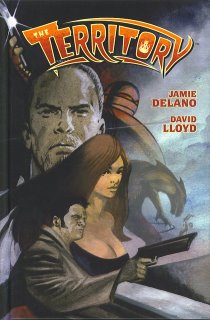 The Territory by Jamie Delano and David Lloyd. Published by Dark Horse. $14.95.
The Territory by Jamie Delano and David Lloyd. Published by Dark Horse. $14.95.
Delano and Lloyd's book came out in 1999, apparently, and was a four-issue series, so I guess it's not a true graphic novel, but it might as well be, seeing as how it's seven years later and it's collected as a nice book. So I'm going to count it!
Unfortunately, this is the weakest book of the lot, which is odd considering the talent involved. Actually, Delano's involvement is one of the reasons I don't like it - Delano has always been guilty of "overwriting" - he obviously believes that he's a lot more loquacious and erudite than he actually is, and it often gets in the way of a pretty good story (have you read World Without End?) In this book, he again gets in the way of the story, and it starts on the first page: "A foul wind ... cheap perfume masking putrefaction. A rotten corpse of dread rising, bloated, from the deep ... its swollen skin split by a lash of elemental light, releasing a slithering frenzy of horror." Sheesh, Jamie, give it a rest!
Like I said, it's a shame, because Lloyd's art is typically nice, and the story, when Delano isn't killing the momentum, is intriguing. A man washes up on a small rock in the middle of an ocean, and he doesn't know who he is. He's picked up pirates and tells them to call him Ishmael. They take him to a strange city where he has to fight for his survival. He sees a woman and becomes obsessed with her, but whenever he gets close to being with her, something happens and the world subtly changes on him. Meanwhile, everyone watches a boring and unfunny cartoon, and he can't understand why they're doing it.
It's a weird little mystery, and although the ending is slightly disappointing, it still fits in with the rest of the book and offers an explanation. Delano manages to throw Ishmael into some tough situations and he does a nice job with the story when he can control himself, which is only occasionally. Lloyd is a perfect artist for this, as he does a nice job with the strange, almost dreamy quality of the city and the world into which Ishmael is tossed. It's not a bad book, but it certainly could be better.
So there you have it - if you're not in the mood to buy monthlies all the time, and you want something a little meatier, check these out. I definitely recommend Brownsville, Cyclone Bill and the Tall Tales, and The Nightmarist, but the other two are certainly worth checking out. Graphic novels galore!
 Brownsville by Neil Kleid and Jake Allen. Published by Comicslit, an imprint of Nantier Beall Minoustchine Publishing, Inc. $18.95.
Brownsville by Neil Kleid and Jake Allen. Published by Comicslit, an imprint of Nantier Beall Minoustchine Publishing, Inc. $18.95.The high concept of Brownsville is "Jewish gangsters of the 1930s." We tend to think of gangsters as Italian, but in Brooklyn and parts of Manhattan in the 1930s the Jews ran things, and Kleid and Allen do a great job of bringing this forgotten world to life. They focus mainly on Albert Tannenbaum, who begins like a lot of youngsters, in awe of the riches and power of the local gangsters and is looking for a way to rebel against his father. He starts small, as usual, but eventually gets in tight with the gangsters and the bosses, including Louis Buchalter. The book is about his rise and fall, but also the rise and fall of organized crime in New York, as it spans the decade of the 1930s and shows the violence these men were willing to commit and the consequences of their actions.
It's not the most original idea, but it is interesting to see it from a Jewish perspective. The book is full of historical figures and what I can only assume is factual data, and Kleid keeps everything humming along, showing what these men do and how they eventually sell each other out. There is no honor here, only looking out for themselves, which is an interesting counterpoint to the myth of the Mob. Allie, especially, is a fascinating character, as he never quite seems to fit in with the gang, even when he's committing murder. He's very much a man who yearns for his father's approval, even after he rejects everything his father stands for. In the last act of the book, when he has been arrested and must choose whether to testify against his former employers, it is his family and the reminder that you can be someone in this world even if you're not rich and powerful that pushes him to his choice. It's an interesting arc for the character.
The art is stark and powerful. Each character looks vaguely the same, but Allen still manages to give them each a distinctive look. The cast is very big, and only once or twice did I have trouble keeping track of who was who based on what they looked like. After some initial confusion, it was easy to identify each person even though they were all dressed alike and were drawn in similar fashion. Allen evokes the time period very nicely, and the book (in black and white) is a pleasure to look at.
One of the few complaints I had about the book is its lack of Jewishness, for want of a better word. Very rarely does Kleid show how these gangsters were so different from Italians. It would have been interesting to see more of a contrast between the Catholic Mob and the Jewish one. He delves into it late in the book, and it made the characters even more interesting, so it was disappointing he didn't do it sooner. After all, we think of gangsters as good Catholics, getting their babies christened while their underlings gun down competitors, and although I wouldn't have wanted Kleid to dip into those sorts of clichés, it would have been nice to see the religious aspect of these men (if it existed) fleshed out a little more.
This is a fine book, and I hope someone at least tried to get it for free over at Jason's blog. If not, keep an eye out for it and pick it up. A very good read.
 Cyclone Bill and the Tall Tales by Dan Dougherty. Published by Moonstone. $16.95.
Cyclone Bill and the Tall Tales by Dan Dougherty. Published by Moonstone. $16.95.This book is so astonishingly good for the first three-quarters that it's an even bigger shame that it goes a bit off the rails at the end - not enough to ruin it, but enough to make it a shame. I still recommend it highly, but it's just so strange how wrong it goes.
The story seems simple enough. Cyclone Bill and the Tall Tales are a band that burst onto the scene with a brilliant album, had some problems, reunited for a second album, and then, one night, Bill was shot and killed while he was on stage. The book begins with a documentary filmmaker, Maggie Bloom, at Graceland, where she has come to beg the ghost of Elvis to stop haunting her. Why is he haunting her? Ah, but that's part of the story, isn't it? She was hired by Bill's girlfriend to make a documentary about him, and she was filming the night he was killed. Bill's band shows up at Graceland as well to discover the truth about Bill's life and death. They watch the film Maggie has shot and slowly learn the story of Bill when they weren't around. Maggie, meanwhile, continues to be haunted.
It's a gripping premise, and the way it unfolds it done very nicely. It turns into a dense tale of betrayal and the quest for fame, and what each person in the story will do to attain it. The man on trial for Bill's murder, Oscar Burden, is a rival artist, but his "band," such as it is, consists of fans who audition constantly depending on what city he's in. He is trying to break down the walls of celebrity, the walls that separate artist from audience, but in the process he becomes a huge celebrity - and steals Bill's girlfriend Rhoda. Each person in the book loses some part of themselves to gain fame, and the implications of this are often front and center in the book, in a way that rises above cliché, which is nice. The ghost story is creepy, too - Maggie isn't sure if she's insane or if she's actually being haunted. Meanwhile, her yearning for Bill's girlfriend complicates both her own sense of self and her relationships with the band. The story, with the presence of Elvis always near, gets under your skin and twists you up - it could easily come apart, but it doesn't.
Until the end, that is. I'm not going to go into it, because I don't want to spoil how the murder trial turns out or how Bill's, and Rhoda's, and Maggie's, and Oscar's quests for fame resolve, but let's just say everything gets a bit too literal. A clue is provided by the cover, but that's all I'm going to say. It's disappointing because it was such a nice psychological drama, and it feels like Dougherty takes the easy way out. Oh well - he wouldn't be the first.
The art is very good - rough and tumble, like rock itself, but the scenes that need to be different - like the creepy ones - convey that sense well. Ironically, the art really shines in the last section, when the story comes apart a bit. Overall, it's a good-looking book.
I definitely recommend this book if you can hunt it down. You may not even mind the ending. I don't even really mind the ending, I just thought it wasn't as good as the rest of the book. But it's certainly worth checking out.
 Top 10: The Forty-Niners by Alan Moore and Gene Ha. Published by America's Best Comics. $24.99.
Top 10: The Forty-Niners by Alan Moore and Gene Ha. Published by America's Best Comics. $24.99.This is coming out (or just came out?) in softcover, so if you don't want to pony up 25 dollars for it, get it in that format. I'm not going to say a lot about this, because it's been out for a while, a lot of other people have said a lot about it, and it's Alan Moore and Gene Ha, so you can guess it's pretty good. That being said, I wonder if this is not as good as it could be, because Moore and Ha like being cute too much with it. It's a good read, and I actually like it more than Top 10 the series, because as much as I enjoyed that (I'm conflicted, so sue me), that was definitely a bit too cutesy for me. By "cutesy" I mean "seeing how many comic characters we can squeeze into the book and make everyone laugh." I don't know much about past comic characters, and I don't have Moore's obsessive memory about everything I've ever seen or read, so it annoyed me, especially because sometimes (not always, but sometimes) the main story was pushed aside for the wallowing in cutesiness. This reins that in a bit, but it's still there, and I just wonder if the slavish love that was dropped on this book was because nerds everywhere were impressed with their arcane knowledge of who is strolling by in the background.
Which is a shame, because this is a nice story about the beginnings of Neopolis and the discrimination that exists against "science heroes" (as well as more mundane minorities like homosexuals) and the government's policy toward Nazi scientists captured at the end of the war. It's a good story, and it's beautifully illustrated by Ha. His work on the series was good, but he obviously had more time to do this, and it shows.
It's a good book, and worth your while, but I wonder if it was voted best original graphic novel by the bloggers in Chris Tamarri's poll because it was the only OGN most people read last year. I wonder.
 The Nightmarist by Duncan Rouleau. Published by Active Images. $14.99.
The Nightmarist by Duncan Rouleau. Published by Active Images. $14.99.The Nightmarist is truly a weird and wonderfully bizarre book. I knew Rouleau only from his stint on Wildcats 3.0, and although I liked his art well enough on that book, it's nothing compared to what he unleashes on this. This is a hard book to read, because it's crowded with images and dense with text on some pages, but it's definitely worth your while. It's hard to describe, but I'll give it a go:
Beth Sorrensen is a young woman who has bad dreams. Nothing shocking there, but we learn that her father was an artist who committed suicide, which naturally causes her some problems, and she's seeing a doctor to work out her issues. She quickly realizes that there is something unusual about her dreams - she is being visited by a weird figure who calls himself the Nightmarist, and her dreams are starting to visit her when she's awake. The Nightmarist tells her that he is an agent of the Ministry of Dreams, which guards people when they sleep from being taken over by the Arbus, demon-like creatures who turn their victims insane and cause them to commit all sorts of horrible acts. In all this, Beth might just be the savior of mankind. She, of course, wants nothing to do with it, and she can't defeat the Arbus until she (wait for it!) defeats her own personal demons!
It's a very creepy book that examines the nature of reality, how much our dreams and nightmares really influence us, how we can make the world a better place, and how the past always intrudes on the present. The art is beautiful, as Rouleau uses drawings and various media to put together a true nightmare world. Although we're quite sure that Beth is actually experiencing these things and isn't insane, like everyone keeps telling her, Rouleau does a nice job of keeping that option open, until we're questioning our beliefs just for the sake of questioning them. As a "horror" book, it's much more concerned with the horror in our mind, and so although there are scenes where Beth is cut open and lying on an operating table (in her dream, that is), the horror is much more subtle and unsettling. The one problem I have is (as is often the case with comics) that Rouleau gives people an excuse for doing horrible things - "I was possessed!" It's not terribly egregious, but it bugs me when authors use that cop-out. I'm not exactly sure what he could have done differently, but like I said, it's not the worst thing in the world. It gives the people a chance to make a choice toward the end, so I guess that's okay.
This is a very different kind of book, and very nicely done. Seek it!
 The Territory by Jamie Delano and David Lloyd. Published by Dark Horse. $14.95.
The Territory by Jamie Delano and David Lloyd. Published by Dark Horse. $14.95.Delano and Lloyd's book came out in 1999, apparently, and was a four-issue series, so I guess it's not a true graphic novel, but it might as well be, seeing as how it's seven years later and it's collected as a nice book. So I'm going to count it!
Unfortunately, this is the weakest book of the lot, which is odd considering the talent involved. Actually, Delano's involvement is one of the reasons I don't like it - Delano has always been guilty of "overwriting" - he obviously believes that he's a lot more loquacious and erudite than he actually is, and it often gets in the way of a pretty good story (have you read World Without End?) In this book, he again gets in the way of the story, and it starts on the first page: "A foul wind ... cheap perfume masking putrefaction. A rotten corpse of dread rising, bloated, from the deep ... its swollen skin split by a lash of elemental light, releasing a slithering frenzy of horror." Sheesh, Jamie, give it a rest!
Like I said, it's a shame, because Lloyd's art is typically nice, and the story, when Delano isn't killing the momentum, is intriguing. A man washes up on a small rock in the middle of an ocean, and he doesn't know who he is. He's picked up pirates and tells them to call him Ishmael. They take him to a strange city where he has to fight for his survival. He sees a woman and becomes obsessed with her, but whenever he gets close to being with her, something happens and the world subtly changes on him. Meanwhile, everyone watches a boring and unfunny cartoon, and he can't understand why they're doing it.
It's a weird little mystery, and although the ending is slightly disappointing, it still fits in with the rest of the book and offers an explanation. Delano manages to throw Ishmael into some tough situations and he does a nice job with the story when he can control himself, which is only occasionally. Lloyd is a perfect artist for this, as he does a nice job with the strange, almost dreamy quality of the city and the world into which Ishmael is tossed. It's not a bad book, but it certainly could be better.
So there you have it - if you're not in the mood to buy monthlies all the time, and you want something a little meatier, check these out. I definitely recommend Brownsville, Cyclone Bill and the Tall Tales, and The Nightmarist, but the other two are certainly worth checking out. Graphic novels galore!
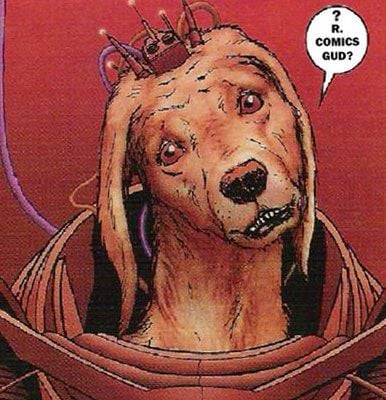


8 Comments:
The high concept of Brownsville is "Jewish gangsters of the 1930s." We tend to think of gangsters as Italian, but in Brooklyn and parts of Manhattan in the 1930s the Jews ran things, and Kleid and Allen do a great job of bringing this forgotten world to life.
Thanks for the heads up. Sounds rather intriguing. And since I'm Jewish, I want to check this out. It can be interesting to see Jewish antagonists, just as long as the characters are well-written and not stereotypes.
The Nightmarist by Duncan Rouleau
Ehhh... not so sure about this one, though. In the past, Rouleau's artwork has often been overly complicated, at worst impenetrable. I especially recall a few issues of Alpha Flight where I had no clue what was going on. Caused me to quit the series.
Hey! Thanks for the great review, dude!
A few people have indeed commented on the lack of religious depth of the book but the thing is that BROWNSVILLE is (to me) not a book about Jews that happen to be gangsters; It's a book about gangsters that happen to be Jews. I wanted to toss in some of that here and there (mostly in terms of how it weighed on certain decisions the troop made) but didn't want to get TOO embroiled into it at the sake of the history.
In any event, thanks so much for the great review. I'm kvelling over here!
-Kleid
THE NIGHTMARIST is so bad-ass I wish *I* had published it. I've been moving them at my local shop by telling people it's "SANDMAN directed by Michael Bay."
But "It's bad-ass" covers it for most people.
Lar
"I just wonder if the slavish love that was dropped on this book was because nerds everywhere were impressed with their arcane knowledge of who is strolling by in the background."
For what it's worth, my wife and I love Top 10 the most of all of Moore's ABC works. This was before I even noticed all those comic book references in the background, which made it funnier once I realized how many there really were. My wife, on the other hand, doesn't give a rat's ass about any of that and liked it because it was funny and smart and amazingly well structured.
I didn't think I'd care too much for The 49'ers because I wanted more of the guys at the precinct as written by Moore. I bought the HC anyway and was very happy to be proven totally wrong about that.
Edward - I liked Top 10 a lot, too, but whenever I read people raving about it, they always seemed to say stuff like "The cat is Galactus!" or "Check out Asterix in the Roman colisseum!" It got in the way of a fine police procedural, I thought, and it seems like it gets in the way of this book, too. Just a little, not a lot.
"Sandman directed by Michael Bay." That's not bad, even though I don't really like Michael Bay and I like The Nightmarist. It's still pretty accurate. And it's definitely bad-ass.
Good point, Neil. Thanks for clarifying.
Hey, thanks for reviewing Cyclone Bill for me. I can understand why the ending disappointed you after reading what you did like about the book. Of course, I stand by it but I get what you mean.
Sincerely though, thanks. I appreciate anyone who's willing to take the time to read and review my book.
Dan Dougherty
dansabigdeal@yahoo.com
Dan: I certainly didn't HATE the ending, because it made a certain amount of sense flowing from the first two-thirds or so of the book. I just thought it turned too much into a typical "comic book" ending, which is why it disappointed me. Still, I would recommend the book to anyone.
Thanks for the positive review. I'm glad that you enjoyed it. It was a great deal of work and to hear a kind word makes it all the more worthwhile.
As far as "directed by Michael Bay" - well whatever, I appreciate the thumbs up none the less.
Post a Comment
<< Home